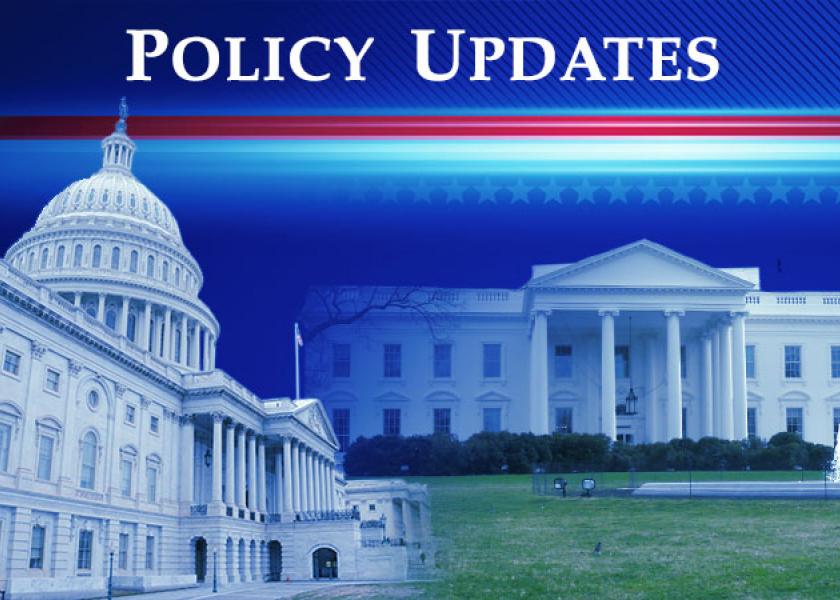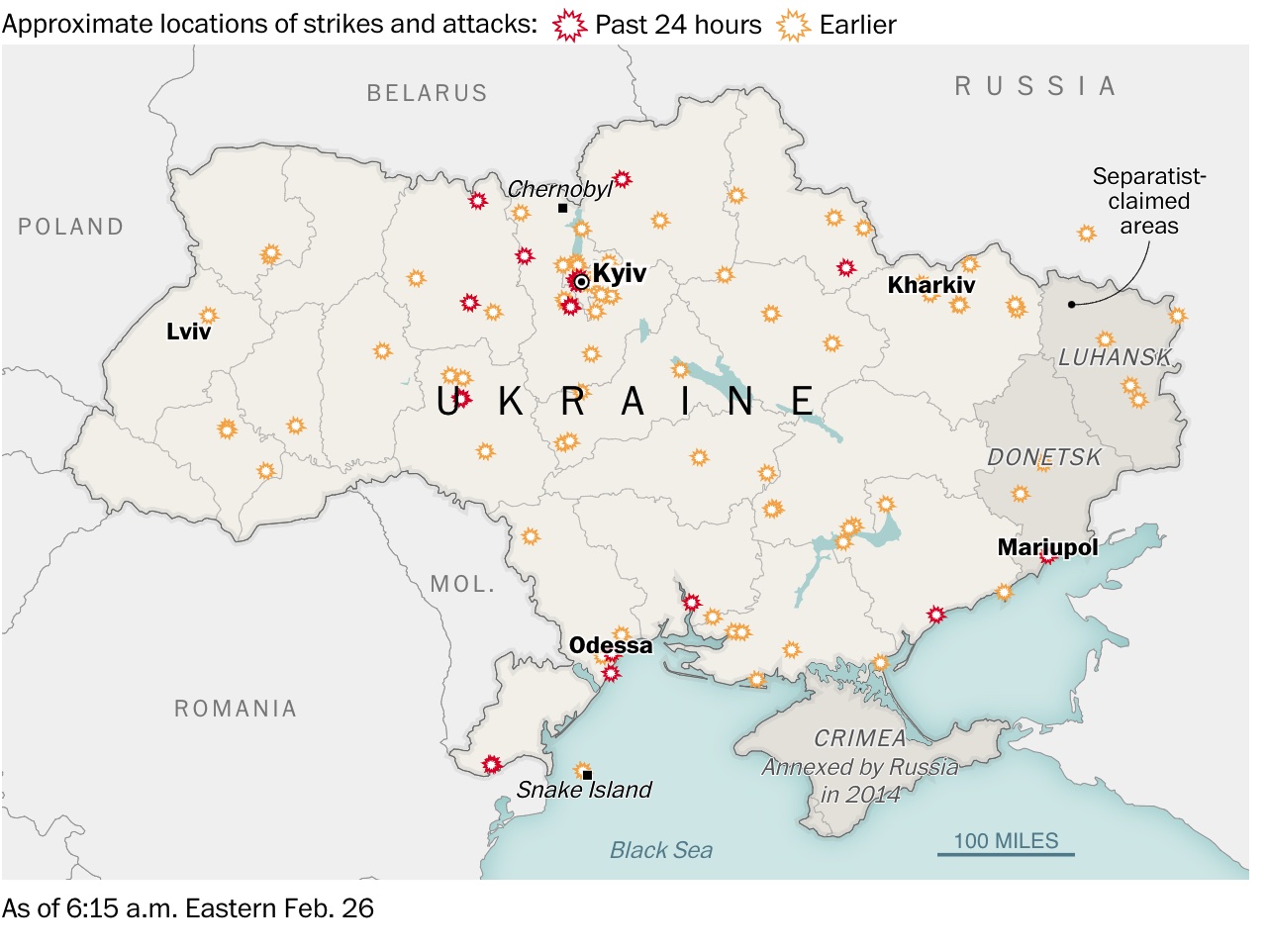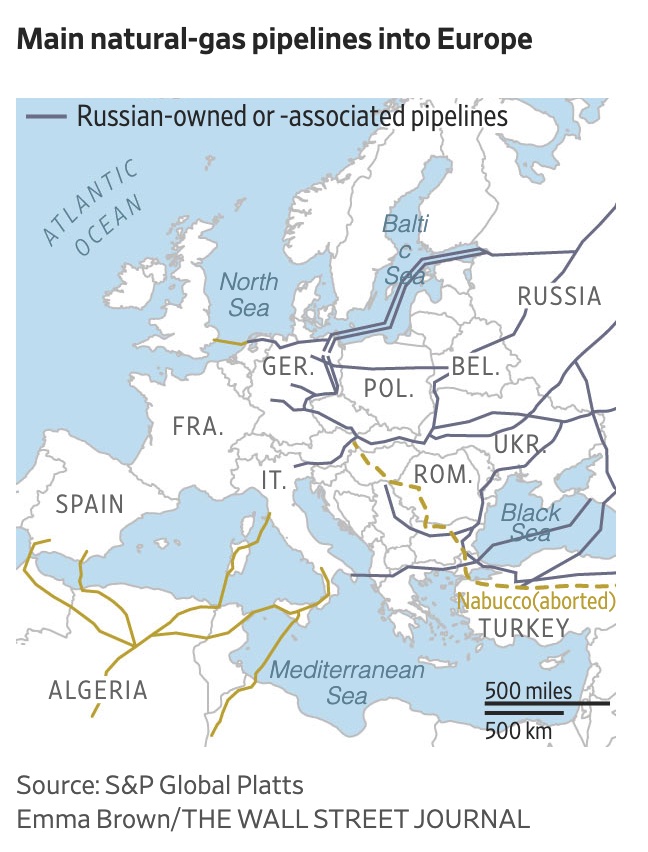Putin Calls Off Peace Talks as Ukrainian Forces Showing Stiff Resistance

China distances itself from Russia | U.S., EU mull SWIFT action against Russia, announce other sanctions
|
RUSSIA/UKRAINE |
— Russia/Ukraine update: Russian leader Vladimir Putin ramped up its Ukraine invasion and pronounced proposed peace talks dead. Meanwhile, China signaled a shift away from Russia as war casualties mount, all leading to an expected continuation of market volatility on Monday, including ag markets. As for the fighting, the Russian military advance on Kyiv is going slower than U.S. intelligence anticipated, a senior U.S. defense official said, with Ukrainian forces showing stiff resistance. Air missile defense systems are still working even though installations were destroyed by Russia’s opening salvos, and Ukrainian fighter jets continue to engage Russian warplanes, a U.S. official said. (Source of map: Washington Post)

- Any chance of peace talks ends. Speaking on a conference call Saturday, Kremlin spokesman Dmitry Peskov said that Kyiv had refused to conduct negotiations, after the two sides failed to reach agreement on a format or a location for any talks. “Because the Ukrainian side in effect refused negotiations, the main Russian forces resumed their advance according to the plan of the operation,” he said, declining to provide more details. Ukrainian presidential adviser Mykhaylo Podolyak dismissed Peskov’s comments as “tactics,” saying that Russia was trying to consign diplomacy “to a dead end even before talks begin,” according to Interfax. The president “categorically rules out any ultimatums and conditions,” it cited him as saying.
- China distanced itself from Russia, with Foreign Minister Wang Yi saying that the situation in Ukraine “is something China does not want to see,” adding that it was “absolutely imperative” for all sides to exercise restraint. China abstained from a U.N. vote on the topic on Friday. “The safety of ordinary people’s lives and properties should be effectively safeguarded, and in particular, large-scale humanitarian crises have to be prevented,” a report cited Yi as saying.
- U.S. on Friday sanctioned President Vladimir Putin of Russia as part of a broad range of new measures. Penalties targeted not only Putin but members of his inner circle. White House press secretary Jen Psaki said that the administration was targeting Putin, Foreign Minister Sergei Lavrov and other members of Russia’s national security team. The punitive action includes restrictions on Putin’s ability to travel to the U.S. The European Union was the first to freeze any European assets of Putin and Lavrov, surprising the Biden administration, which quickly echoed similar action. Meanwhile, Switzerland prohibited its banks from doing new business with any of the individuals, banks or companies on the EU sanctions list to help prevent Russia from circumventing those sanctions. None of Putin’s overseas assets bear his name, and to make this move work, Western officials know they will have to close out accounts owned by the people who are safeguarding his billions in ill-gotten gains. The U.S. and Europe have developed a good sense of who these people are.
Some analysts say efforts must be taken to block Russia’s central bank from accessing Western financial markets, and sanctioning Russia’s energy sector — including Gazprom and Rosneft.
- Biden administration will also impose full blocking sanctions on the state-owned Russian Direct Investment Fund, a sovereign-wealth fund, according to White House press secretary Jen Psaki. The administration’s broader aim is to target all of Russia’s banks on a rolling basis, a U.S. official said.
- U.S. is also exploring more novel strategies, such as sanctioning Russia’s cryptocurrency market.
- U.S. puts banning Russia from SWIFT global system back in play. Washington is seriously considering whether to seek Russia’s expulsion from SWIFT, which delivers secure messages among more than 11,000 financial institutions and companies, in over 200 countries and territories. The Treasury Department said its existing actions target 80% of all banking assets in Russia and limit the country’s access to the global financial system. “We’re open to taking additional actions to constrain and degrade Russia’s economy, including looking at Swift, which we want to do in concert with our allies and partners, especially in Europe,” a senior administration official said.
The EU said on Friday it would cut off 70% of Russia’s banking system from international financial markets and place limits on the amount of money that Russian elites can hold in the EU. Meanwhile, the 27-nation EU moved closer toward supporting Russia’s exclusion from the SWIFT financial messaging system. Poland’s Prime Minister Mateusz Morawiecki and Lithuanian President Gitanas Nauseda met with Chancellor Olaf Scholz in Berlin on Saturday in a bid to overturn one of the final holdouts to EU agreement on the measure. Blocking Moscow from the system would require unanimity among the 27 EU countries. Italian Prime Minister Mario Draghi told Ukrainian President Volodymyr Zelenskyy that he fully supports the EU’s line on sanctions, “including those within the SWIFT framework,” according to a statement from Draghi’s office. Italy had previously expressed opposition to excluding Russia from the SWIFT system.
Germany hasn’t ruled out cutting Moscow off from SWIFT, but it has previously voiced reservations about the measure and underscored the severe implications, including the possibility that it would put deliveries of Russian gas at risk. Russia’s state-run energy giant Gazprom PJSC supplies about a third of all gas consumed in Europe. There are also concerns Russia could retaliate with harsh countermeasures. Scholz has called a special session of the German parliament on Sunday, where he is to give a speech outlining his government’s response to Russia’s invasion of Ukraine.
- The North Atlantic Treaty Organization (NATO) has for the first time activated a military response force designed to boost the defenses of frontline nations in eastern Europe that feel vulnerable after Russia’s military assault on Ukraine. Ukraine is not a NATO member, but it borders four nations that are: Poland, Slovakia, Hungary and Romania. The U.S. and other NATO allies have pledged to protect their eastern and central European members under the alliance’s defining Article 5 mutual defense commitments.
- An issue is whether and how to support an insurgency should the government in Kyiv collapse.
— Energy issues:
- Russia is Europe’s biggest supplier of gas, crude oil and coal. Delivered via a sprawling pipeline network (see map below) and on vessels carrying supercooled gas, Russian gas met about 38% of European Union demand in 2020, according to the most recent official data. The uneven distribution of LNG terminals in Europe poses an additional complication. A third of Europe’s LNG-import capacity sits in Spain and Portugal, analysts at S&P Global Platts say. A further 24% is in the U.K.

- Germany’s leading power utilities have declined to extend the life of their last operating nuclear power plants beyond a government-imposed deadline to shut them down by the end of the year amid calls to keep them running to reduce dependence on Russian gas in the wake of Moscow’s war in Ukraine. Germany has been phasing out nuclear power since 2000 and is scheduled to shut down its last three nuclear power plants this year. Günther Oettinger, a conservative politician and former European Union commissioner, has urged Germany and the power utilities to reconsider and asked the utilities to keep their nuclear plants running beyond the deadline.
- U.S. oil industry uses Ukraine invasion to push for more drilling at home. “As crisis looms in Ukraine, U.S. energy leadership is more important than ever,” the American Petroleum Institute wrote on Twitter with a photo that read: “Let’s unleash American energy. Protect our energy security.” The industry’s demands have focused on reversing steps the Biden administration has taken to start reining in the production of fossil fuels, the main driver of climate change. The administration should release permits for drilling on federal lands, the lobby urged, and push ahead with leasing more tracts for offshore oil and development. The API, which condemned the invasion, also called on President Biden to accelerate permits for energy infrastructure and to roll back legal and regulatory uncertainty — getting rules and lawsuits out of the way.






